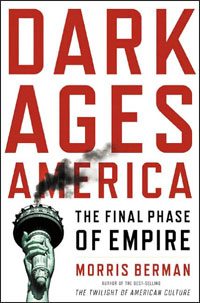Book Notes
 Morris Berman, Dark Ages America; The Final Phase of Empire (New York: Norton, 2006), 385pp.
Morris Berman, Dark Ages America; The Final Phase of Empire (New York: Norton, 2006), 385pp.
In his earlier declamation of national decline called The Twilight of American Culture (2000), cultural historian and social critic Morris Berman described the dusk that had settled over American culture. His latest book argues that we have regressed to a medieval-like darkness from which we will never emerge. He does not use these evocative metaphors for mere rhetorical effect, either. While many on the right celebrate what they think is our global and imperial hegemony, Berman the cultural curmudgeon argues the counter-intuitive position that we are in literal and catastrophic decline as a civilization. He draws comparisons to the fall of Rome in four broad areas—the roll back of the Enlightenment in which religion triumphs over reason, the break down of education (consider that one-third of American children do not graduate from high school), the legalization of torture, and the marginalization of America from the rest of the world in areas like health care, environment, entertainment, science, work, incarceration rates, violent crime, television, pornography, children and community.
I happen to agree with Berman's thesis, but I thought his argument was weak for a number of reasons. His position is not new, of course. Robert Kaplan's An Empire Wilderness; Travels into America's Future (1998), the more recent American Theocracy (2006) by Kevin Phillips, or, in a different vein, Jared Diamond's Collapse (2005), have all made similar arguments. Berman spends almost half of his book on American foreign policy and globalization (economy and technology), which provides him an occasion for predictable left-liberal cant; he is merciless when it comes to Bush Jr., to the point of ad hominem pettiness. His personal anecdotes are interesting, but not a way to make a convincing argument. His casual (if erudite) style is prone to overstatement. Still, he does not spare Clinton or Democrats, whom he describes as "bankrupt," and is careful to affirm Walter McDougall's assertion that "no large nation on earth has provided more stability, prosperity, security, and liberty to more people than has the United States." The ultimate issue is whether what he says is true, that, to its own self-destruction, America now construes the world in a "Manichean" fashion (good versus evil), trying to remake the new world disorder in our own image. "Hegemonic empires," Henry Kissinger noted, "almost automatically elicit universal resistance, which is why all such claimants have sooner or later exhausted themselves."


